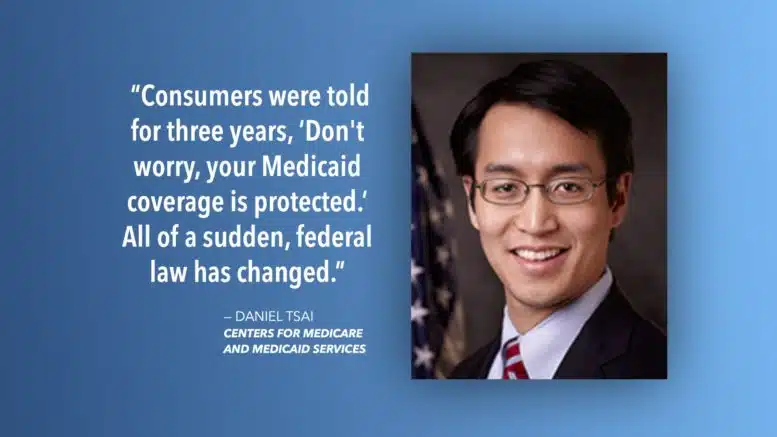By Jaymie Baxley
North Carolina is in the process of reviewing Medicaid eligibility for more than 2.9 million residents amid the unwinding of a federal mandate that prevented states from kicking people off the rolls during the COVID-19 pandemic.
Known as the continuous coverage requirement, the mandate created by Congress in early 2020 protected Medicaid beneficiaries from losing coverage even if they no longer qualified for the program. It expired in April with the end of the public health emergency, allowing states to disenroll residents for the first time in nearly three years.
Terminations are not set to begin until July in North Carolina, but a top Medicaid official for the Biden administration has noticed a concerning trend among states that are further along in the process.
“What we’re seeing across the country for states that have started to disenroll people is that there are large numbers of terminations,” Daniel Tsai, director of the Center for Medicaid and CHIP Services at the U.S. Centers for Medicare and Medicaid Services, said during a videoconference with North Carolina reporters on June 9.
He said a lot of the people losing coverage was because of “procedural red tape,” rather than being over the income limits that determine eligibility. The issue is compounded by a lack of public awareness, according to Tsai. He said many at-risk enrollees do not know about the unwinding and the effect it could have on their benefits.
“I would anticipate when terminations actually start, then you’re going to start to see a bunch of folks realizing for the first time that this is happening,” he said. “That’s of concern to all of us, and we really want to make sure that people get the word out.”
While the criteria for Medicaid varies from place to place, most states use the federal poverty level as a baseline for eligibility. This means the people at greatest risk of losing coverage should be those with incomes that now exceed the limit for their state, which in North Carolina is $24,860 in annual earnings for a family of three.
Several states are reporting worryingly high rates of terminations for what are essentially paperwork issues. A recent study by KFF, formerly known as Kaiser Family Foundation, found that more than 80 percent of unwinding-related terminations in Arkansas, Florida, Indiana and West Virginia involved residents who “did not complete the enrollment process and may or may not still be eligible for Medicaid.”
“Millions of Americans’ health insurance and health care coverage is really at risk,” Tsai said. “We are urging every state across the country to do more and to take up many of the strategies we have put out on the table from a federal standpoint that really help make it easier for eligible people to stay covered.”
Resuming renewals
One strategy the Biden administration is promoting, Tsai said, is automatically renewing coverage for people who continue to qualify for Medicaid. According to North Carolina’s unwinding plan, the state hopes to complete most renewals “without any contact with the beneficiary” using information collected from wage databases and other sources.
Still, there will be cases where the state does not have all the information needed to confirm a Medicaid recipient’s eligibility and must reach out to the person by mail. If that beneficiary fails to respond within 30 days, their coverage could be terminated.
“One of the really important messages for people is to not only update their contact information, but return the mail,” Tsai said.
Before the pandemic, Medicaid participants typically underwent annual or semiannual reviews to verify that they continued to qualify for coverage. But people who were added to the rolls while the federal mandate was in place have never gone through that process. Statewide enrollment grew 36 percent during the pandemic, with over 797,000 people newly qualifying for coverage from March 2020 until April of this year.
“What we find is a lot of people have no idea that Medicaid renewals have started,” Tsai said. “Consumers were told for three years, ‘Don’t worry, your Medicaid coverage is protected.’
“All of a sudden federal law has changed. A renewal form comes but the average consumer doesn’t know what Congress has done and doesn’t even know they need to respond to something.”
In a statement to NC Health News, the N.C. Department of Health and Human Services said 300,000 people are expected to lose coverage over the next 12 months. The agency says it is working to “ensure people eligible for Medicaid do not lose coverage and those no longer eligible are transitioned smoothly to affordable health plans.”
For some North Carolinians, that may mean going through the federal health insurance marketplace.
People ordinarily have only 60 days to enroll in a marketplace plan after losing Medicaid, but CMS has created a special enrollment period for individuals affected by the unwinding. They can apply for marketplace coverage at any time through June 31, 2024.
Expansion overlap
The timing of the unwinding presents a unique challenge for North Carolina, which is set to become the 40th state to expand access to Medicaid.
Medicaid expansion was signed into law by Gov. Roy Cooper mere days before the continuous coverage mandate expired. It is expected to benefit hundreds of thousands of North Carolinians with incomes that are less than 138 percent of the federal poverty level for their family size — $34,306 for a family of three — up from the state’s previous limit of 100 percent.
DHHS has confirmed that many residents who lose coverage during the unwinding will become eligible again once expansion officially goes into effect, likely this summer. That won’t happen until a state budget is approved, which still could be months away.
“When you start renewals with expansion still to come and you’ve got a gap, it just leads to people having a gap in coverage and some confusion and resource challenges,” Tsai said. “Hopefully folks will have every chance in North Carolina to, if they’re eligible for Medicaid expansion when that starts, be able to seamlessly transition into that.
“And of course, if they’re not eligible for Medicaid, we want to make sure they’re getting over to other forms of coverage.”










